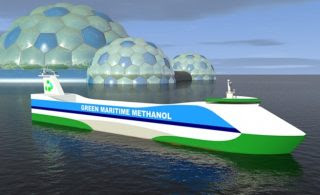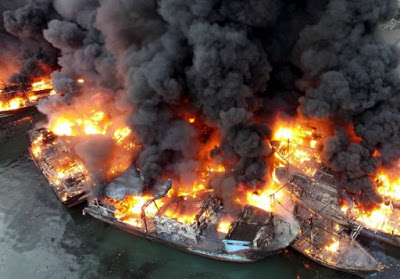Dutch shipowners,
shipyards, manufacturers and ports of Amsterdam and Rotterdam have joined
forces to study methanol as a marine fuel ahead of the IMO’s 2020 sulphur
cap.
shipyards, manufacturers and ports of Amsterdam and Rotterdam have joined
forces to study methanol as a marine fuel ahead of the IMO’s 2020 sulphur
cap.
The consortium, supported by Maritime Knowledge
Centre, would look into the feasibility of methanol as a sustainable
alternative transport fuel in the maritime sector.
Centre, would look into the feasibility of methanol as a sustainable
alternative transport fuel in the maritime sector.
“As part of the project, the partners will look at
concrete possibilities to adopt methanol as marine fuel on either newbuilds or
conversions of the existing fleet,” Pieter Boersma,
Business Director Maritime & Offshore of TNO, said.
concrete possibilities to adopt methanol as marine fuel on either newbuilds or
conversions of the existing fleet,” Pieter Boersma,
Business Director Maritime & Offshore of TNO, said.
Shipowners Boskalis, The Royal Netherlands Navy, Van
Oord and Wagenborg Shipping will take part in the consortium, together with
shipbuilders, Damen Shipyards, Feadship, Royal IHC and engine manufacturers Pon
Power and Wärtsilä together with VIV, as well as equipment suppliers Marine
Service Noord and service providers C-Job Naval Architects.
Oord and Wagenborg Shipping will take part in the consortium, together with
shipbuilders, Damen Shipyards, Feadship, Royal IHC and engine manufacturers Pon
Power and Wärtsilä together with VIV, as well as equipment suppliers Marine
Service Noord and service providers C-Job Naval Architects.
Work to study the infrastructure and supply chain for
methanol is also addressed by the participation of The Netherlands’ two largest
ports, Rotterdam and Amsterdam, as well as methanol suppliers BioMCN and Helm
Proman and trade organization The Methanol Institute.
methanol is also addressed by the participation of The Netherlands’ two largest
ports, Rotterdam and Amsterdam, as well as methanol suppliers BioMCN and Helm
Proman and trade organization The Methanol Institute.
The Netherlands’ research institutes, including TNO, TU
Delft, NLDA and Marin, also invest in this theme and provide knowledge-building
and research capacity for the project.
Delft, NLDA and Marin, also invest in this theme and provide knowledge-building
and research capacity for the project.
The Green Maritime Methanol project, supported by TKI
Maritime and the Netherlands Ministry of Economic Affairs, is expected to be
completed within two years.
Maritime and the Netherlands Ministry of Economic Affairs, is expected to be
completed within two years.
World Maritime News.


































































